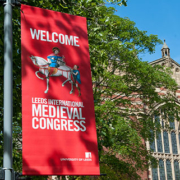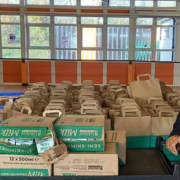Facilitating Events during a Pandemic
The University Events and Conferencing team’s ability to be flexible and innovative resulted in most events being delivered on virtual platforms, but a few on-campus events took place in line with Government social distancing guidelines.
At a time when the world had gone virtual, to run an in-person activity on campus took immense commitment from both strategic leaders and front-line teams to safely deliver an in-person activity during a global pandemic.
Working closely with the external event organisers the conferencing team delivered a three week, in-person event, providing over 2600 bed nights and supporting the delivery of an additional 130 warranted officers to be deployed in their forces from September 2020.
During the organisation of the event there was a real need to engage senior leaders, and key stakeholders such as Health and Safety services, on the importance of the activity and to promote how it could be delivered safely. In particular, the team had to:
- Arrange for priority buildings to be unlocked and rooms to be opened and assessed as Covid 19 secure
- Reduce capacities across the portfolio to allow for 2m social distancing
- Agree and share best practice in a Covid 19 environment (including face coverings, sanitiser stations)
- Amend the catering offer to ensure safety for all participants, staff and colleagues
- Provide sufficient accommodation to allow for minimal interaction between participants, and to allow participants to operate in ‘bubbles’
- Agree a protocol for isolation and quarantine should it be required
- Provide additional car parking to negate the use of public transport
- Support the digital delivery of some of the programme to reduce unnecessary cross over of participants
Adapting quickly to maintain the University’s event business was a priority for the events and conferencing team. In the move to virtual events, a scoping project group was established with key stakeholders including event organisers and conference managers. The group conducted thorough research, testing and evaluation of possible solutions. The chosen platform was multi-functional and included a fully searchable interactive programme, speaker and attendee information, sponsors and exhibitor profiles, social media feeds, downloadable abstracts, and surveys.
To improve accessibility and ensure event user experience remained high the platform was made available through google play and the app store making it easy to download on mobile phones and tablets. To ensure events ran smoothly, instruction documents with technical and best practice advice for presenters to pre-record content and for those giving live presentations were produced.
The team went to great lengths to ensure event attendees had a great experience by providing access to the online platform in advance of the event. This allowed attendees to view on-demand content, build profiles and familiarise themselves with the platform. When the event began, links to the live session rooms were made available. Additionally, some sessions were recorded and made available to view on-demand.
As a result of this work, the team discovered that events which were usually only accessible to UK attendees attracted a wider international audience, with some events doubling their expected attendance. As content was made available on-demand, issues with time zones were avoided. Similarly, the creation of a YouTube channel to host the videos helped create a community and bring increased opportunities for sharing research.
Virtual International Medieval Congress (vIMC) 2020 client feedback:
“I have been very impressed with the vIMC- it must have been an immense effort to get everything organised in time and with little time to prepare. I have been very impressed with how well everything works, and I was particularly impressed by the efforts to maintain the social aspect of the conference, despite the circumstances. I cannot imagine how many hours the IMC Team must have put into this, and I’m very impressed indeed.”



